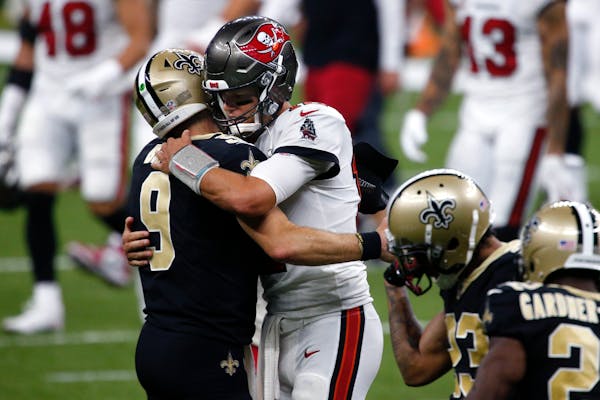Last season, the Packers went 13-3, won a playoff game, expressed supreme confidence against the NFC's top defense and were squashed 27-0 in the first half of a blowout loss to the 49ers.
This season, the Packers again went 13-3 and again are expressing supreme confidence against a top-ranked defense heading into Saturday's NFC divisional playoff game against the Rams (11-6).
So, Aaron Rodgers, what's the difference this time around?
And don't say home-field advantage as the No. 1 seed since COVID-19 restrictions and a weather forecast of 35 degrees should reduce Lambeau Field to an empty, fairly comfortable neutral field.
"I think the belief [in ourselves] is very similar," Rodgers said this week. "We felt like we could win it last year. But the Niners were such a dominant team last year. That kind of hit our confidence maybe a little bit. We didn't have maybe the same type of belief as we do this year.
"But look, confidence is an interesting thing. I feel we all had confidence going into that NFC Championship game that we were going to win and go to the Super Bowl. That obviously didn't happen. [The 49ers] got out to a big lead early. But I feel we have a lot of confidence this year. We believe in ourselves."
Who knows what will happen when the Packers are involved in a divisional playoff game involving a No. 1 seed? After all, Green Bay has been part of the last three upsets of the No. 1 NFC team in this round.
In 2011, the Packers were 15-1 when they lost at home to the Cowboys. In 2010 and 2016, it was the Packers who upset the No. 1 seeds — Atlanta and Dallas, respectively.
"Look," Rodgers said, "when you get to this point of the season, everyone is good."
But these Packers are better in Year 2 of the Matt LaFleur era than in his rookie season as a head coach.
"Offensively, we're just a much better team than we were," Rodgers said. "We're a much more efficient team. That helps, for sure. Last year, we were just so up and down. I think that's been the biggest difference offensively is we're playing with a lot more confidence."
A year ago, the Packers ranked 18th in total offense, 17th in passing and 15th in scoring (23.5). The consensus feeling was they'd go nowhere without latching on to an elite wideout from perhaps the best class of receivers ever.
Draft day came, and the Packers selected a quarterback, Jordan Love, in the first round. Seven rounds passed without the Packers selecting a single receiver.
They were so doomed, right?
Not exactly. They ranked fifth in total offense, ninth in passing and first in scoring (31.8).
Meanwhile, Rodgers did something that's hard to do in today's NFL: He stood head and shoulders above one of the best collective groups of superstar quarterbacks.
Eight of those quarterbacks are still playing. The AFC features four stars under the age of 26, a first for a conference in divisional-round play. The NFC has three future first-ballot Hall of Famers older than 36 and the first playoff meeting between two 40-somethings – Tom Brady, 43, and Drew Brees, 42.
As bright as each quarterback has been, Rodgers outshone them all with what likely will be his third MVP season.
Rodgers did so many things so historically well this season, the Packers probably needed a week to put them all together in a package they sent to the MVP voters.
A personal favorite was this one: Rodgers led the league in interception percentage (0.95) for an NFL-record third consecutive season, joining Sammy Baugh as the only players to lead the league in that category five times.
The five times Baugh did it between 1940 and '47, he threw only 1,084 passes and was intercepted 48 times. The five times Rodgers has done it between 2009 and '20, he threw the ball 2,753 times and was intercepted 23 times.
Last season, LaFleur's offense tied the franchise record for fewest giveaways (13). This season, it set the record at 11 while also leading the NFL in points (509) and touchdowns (66).
Somehow, Rodgers keeps finding ways to lead the league in explosive categories — most touchdowns (48), — and efficiency categories — passer rating (121.5), completion percentage (.707), fewest interceptions (five).
The 121.5 passer rating is second in NFL history behind Rodgers' 122.5 in 2011. His 14 games with a 100-plus rating is a record. Ditto for his 10 games with a 120-plus rating.
Add it all up and well, yeah, there does appear to be ample reason for the Packers to feel more confident about this year's 13-3 team than last year's 13-3 team.


